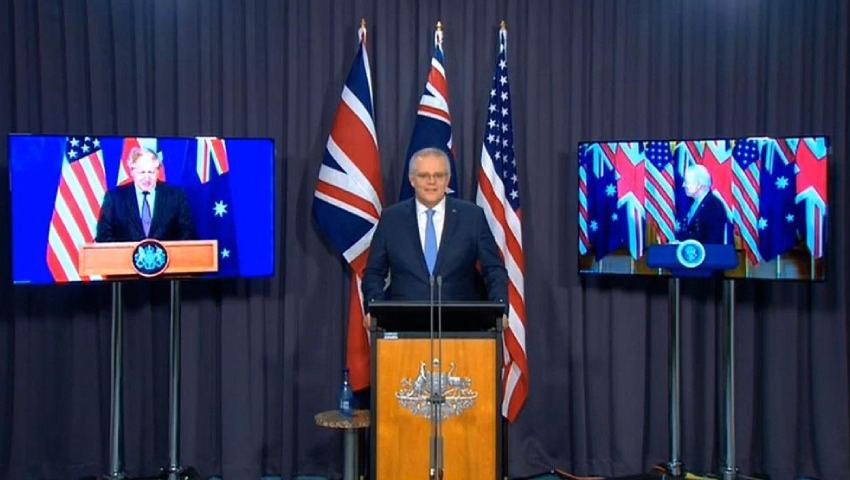Does Australia risk weakening ties with regional neighbours by too eagerly attaching itself to old allies?
Last week, former prime minister Paul Keating lamented on the newly established AUKUS pact between Australia, the United Kingdom and the United States.
Keating accused the Commonwealth government of hastily assuming an aggressive strategic posture, risking conflict with China in a bid to appease the United States.
The former Labor prime minister suggested Canberra instead focus on fostering relationships with regional neighbours, particularly through ASEAN, and establishing dialogue with Beijing.
“[Every] leader in ASEAN knows we have no relationship with Beijing, so why would the prime minister of Malaysia, or Singapore, or Thailand talk to us about East Asia…” he argued.
But according to Dr John Lee, non-resident senior fellow at the United States Studies Centre, criticisms of Australia’s dependence on old allies like the US and UK ignore realities of regional diplomacy.
“Obsolete devotion to the Anglosphere is an easy line to run. However, those who believe agreements such as AUKUS are a foolish retreat into the past tend to treat alliances as if they are as breezy and informal as choosing a new best friend in primary school,” he writes.
“The confluence of values and interests that ground genuine alliances does not happen easily or quickly. Japan is the closest we have to an Asian ally and that relationship has taken decades to nurture and mature.”
Lee contends that the renewed emphasis on the US alliance “immeasurably enhances” Australia’s standing and relevance in the Indo-Pacific.
He writes that regional neighbours are assured by Australia’s close ties with the United States amid the growing threat posed by Beijing.
“It is one reason our strategic relationship with every Asian maritime nation, except for China and North Korea, is in rude health and heading in positive directions,” he continues.
“This includes those with which we once had difficult relations such as Indonesia and India. All agree the only great power in the region demanding subservience, and threatening revision of boundaries and maritime territories through force, is China.”
The US Studies Centre analyst also notes that criticism of Australia’s long-standing relationship with the Anglosphere downplays the “aggressive strategic intent” of the Chinese.
He notes the CCP’s increased investment in military capabilities, describing it as the “most rapid military build-up in peacetime history”.
“China spends more on its military each year than the combined outlays of the rest of Asia and Oceania,” Lee adds.
“As the gap continues to grow, there is no prospect of the stability that comes from balance without the US, and the latter needs the territory and assistance of regional allies to remain in Asia.
“If Britain seeks to add what strategic and technological weight it can through AUKUS, then all the better. The worry for most regional countries is not the unexpected formation of AUKUS but that the latter will amount to less than it is promising.”
Moreover, Lee points to bipartisan support within Australia for a “hardened” policy towards China, particularly given its push to assert influence on domestic policy.
“Most of the 14 grievances issued by the Chinese embassy as justification for the economic punishments against us concern domestic policy settings,” he observes.
“Remaining quiet about issues beyond our borders will not save us from Chinese retribution.”
Lee writes that Australia is not “crazy brave” in taking up a fight against inevitable Chinese domination, but, among others, is confident of deterring the CCP and retaining policy sovereignty.
“Regional countries fear Chinese coercion but cannot afford to be on the losing side. They are watching and reacting to whether the US and allies such as Australia can provide an effective check against Beijing when the latter is not standing still,” Lee observes.
“The American and allied calculation is that the longer we wait to counter and balance, the more difficult and costly it will be to do so in a future time.”
The analyst goes on to write that history suggests China would ruthlessly push ahead with its strategic objectives irrespective of the policy approach pursued by Australia and its allies.
“It’s not as if previous softer mindsets encouraged Beijing to slow down or change course. From this perspective, there is no downside for countries moving urgently to counter the worst excesses of Chinese action,” Lee adds.
“To submit to a Sino-centric hierarchical order is to accept and internalise the right for Beijing to coerce, dictate and define the terms of any bilateral agreement.”
Lee concludes: “Unless Beijing changes, which is not likely in the foreseeable future, an unequal grand bargain will not deliver security, prosperity or stability.
“Better to stick with old friends and work with new ones to persuade or else compel China to come to a more even-handed and reasonable set of arrangements.”
Get involved with the discussion and let us know your thoughts on Australia’s future role and position in the Indo-Pacific region and what you would like to see from Australia's political leaders in terms of partisan and bipartisan agenda setting in the comments section below, or get in touch with



